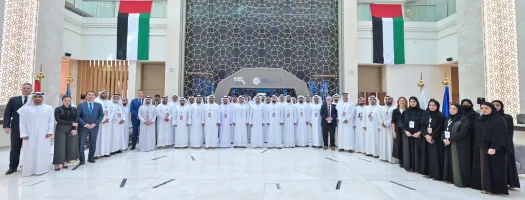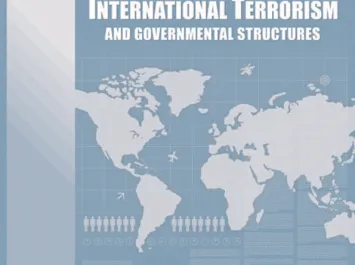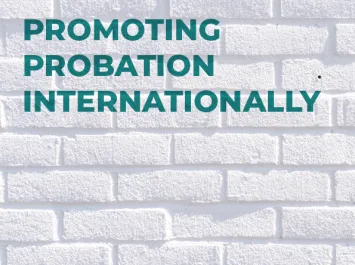The United Arab Emirates (UAE) has taken a significant step towards strengthening its national capacity to prevent and respond to Chemical, Biological, Radiological, and Nuclear (CBRN) crimes by launching a series of comprehensive capacity building and training packages on the prosecution and adjudication of Chemical, Biological, Radiological and Nuclear (CBRN) crimes, organized under the European Union (EU) CBRN Centres of Excellence (CoE) Initiative funded by the EU. The UAE’s programme is co-funded by the EU and the Attorney General’s Office of the UAE.
The opening ceremony, held under the patronage and in the presence of H.E. Dr. Hamad Saif Al Shamsi, Attorney General of the UAE, together with senior officials from government entities, set an inspiring tone for the day. Guests were warmly welcomed by the Attorney General’s Office of the UAE before rising for the national anthem, providing for a fitting introduction to a day dedicated to national resilience and justice. A powerful keynote address delivered by H.E. Dr. Hamad Saif Al Shamsi reaffirmed the country’s commitment to safeguarding security and upholding the rule of law.
The program was then officially launched on 24 November 2025 in a dedicated ceremony featuring the premiere of its official film, offering participants a vivid introduction to the initiative’s vision and impact. Distinguished dignitaries took the stage, including H.E. Counselor Sultan Al-Jowaid, Assistant Attorney General; H.E. Mr. Iñigo Febrel, Deputy Ambassador of the European Union to the UAE; Mr. Talgat Toleubayev, Regional Coordinator at UNICRI; and H.E. Counselor Salem Al-Zaabi, Head of the Public Prosecution for Emergencies, Crises, and Disasters at the Office of the Attorney General of the UAE, each underscoring the critical role of international collaboration and legal readiness in confronting CBRN challenges.
Table-Top Exercise
As the programme moved into its operational phase, a Table-Top Exercise (TTE) was held to begin translating its objectives into practice. Hosted at the headquarters of the Federal Public Prosecution Office in Abu Dhabi from 25 to 26 November 2025, the exercise convened 46 participants, including prosecutors, investigators, judges, forensic experts, law enforcement officials, and criminal justice authorities from across the UAE. They represented the Federal Public Prosecution, Abu Dhabi Public Prosecution, the Dubai Public Prosecution, the Sharjah Public Prosecution & Courts, the Ras Al Khaimah Public Prosecution, the Sharjah Courts, Ministry of Interior, the Abu Dhabi Police, Dubai Police, the Ras Al Khaimah Police, the Fujairah Police, the Federal Authority for Nuclear Regulation, the National Emergency, Crisis and Disaster Management Authority, the Federal Customs Authority, the National Ambulance, the Abu Dhabi Hazardous Materials Center, and the Office of Weapons and Hazardous Materials. One representative of the State of Qatar Public Prosecution took part in this Table-Top Exercise.
Participants collaborated in simulated CBRN crime scenarios designed to enhance inter-agency coordination, reinforce legal frameworks, and improve operational readiness across the criminal justice chain.
Strengthening Collaboration and Legal Preparedness
Opening discussions underscored the importance of sustained engagement between the UAE and the EU CBRN CoE Initiative, emphasizing technical assistance, knowledge exchange, and institutional cooperation. Participants examined mechanisms for national-level investigations, judicial cooperation, and specialized tools to strengthen the prosecution of CBRN crimes.
A dedicated session highlighted human rights safeguards in CBRN criminal proceedings — stressing the need to uphold due process, protect vulnerable populations, and ensure proportionality in legal responses.
Scenario-Based Learning and National Dialogue
Inspired by similar successful initiatives completed in Moldova and Ukraine, the UAE TTX featured two realistic incident scenarios — one biological and one chemical — each structured around progressive operational “injects”. Participants worked through a simulated sequence from incident detection and suspect apprehension to evidence collection, decontamination, and public information procedures. Structured debriefings enabled national teams to evaluate their legal frameworks, operational protocols, and inter-agency coordination. The Prosecutor’s Guides to CBRN Crimes were introduced as practical tools to support legal professionals in handling complex CBRN cases. Participants assessed national investigative and prosecutorial capacities, identified legislative and institutional gaps, and outlined priority actions for strengthening preparedness.
Geographical expansion
The CBRN Investigation, Prosecution, and Adjudication (IPA) initiative is expanding its geographical focus from Europe to other regions of the EU CBRN CoE. The United Arab Emirates, representing the Gulf Cooperation Council (GCC) countries, expressed its interest in strengthening CBRN IPA capabilities at the national level and ensuring the sustainability of the capacity building and training package by integrating selected modules and courses as part of the national training curriculum of relevant training institutions.
Besides enhancing their national capabilities, the UAE leadership has expressed its willingness to serve as a regional training hub for Arabic-speaking countries in the Middle East, North Africa and the Gulf regions. The creation of such regional training hubs further expands this training program beyond the borders of one country and promotes regional security and cross-border cooperation.
The UAE’s proactive engagement in strengthening its CBRN criminal justice capabilities demonstrates a growing recognition of the global nature of CBRN threats. By investing in legal preparedness, national cooperation, and operational readiness, the country is setting a benchmark for resilience and long-term risk mitigation in the Gulf region and beyond.
Advancing National Resilience
The final component featured a chemical incident scenario, mirroring the biological exercise’s structure and reinforcing lessons learned. Teams practiced evidence handling, coordination among agencies, and response planning, highlighting the critical importance of preparedness, legal clarity, and communication in addressing CBRN threats such as illicit trafficking, deliberate release, and misuse of dual-use technologies.
Co-funded by the European Union and implemented by UNICRI, the initiative provides the UAE with tailored training modules and guidance manuals to promote sustainable capacity-building and institutional knowledge.
Strategic Cooperation with the European Union
This joint initiative between the European Union and the United Arab Emirates stands as a powerful testament to their strategic cooperation and enduring partnership in the Gulf region. The United Arab Emirates now serves as a key regional partner for the EU in combating complex crimes, enhancing investigative coordination, and harmonising standards for handling hazardous materials, further reinforcing national and regional readiness and positioning the UAE as a regional bridge for international collaboration in justice and security
About the European Union (EU) Chemical, Biological, Radiological and Nuclear (CBRN) Risk Mitigation Centres of Excellence (CoE)
The EU CBRN CoE initiative is a global Initiative funded and implemented by the European Union as part of its goal to promote peace, stability and conflict prevention. The aim of the Initiative is to mitigate risks and strengthen an all-hazards security governance in Partner Countries of the EU following a voluntary and demand-driven approach.
The EU CBRN CoE is led by the European Commission’s Service for Foreign Policy Instruments (FPI), in close coordination with the European External Action Service (EEAS). The European Commission's Joint Research Centre (JRC) provides technical support to Partner Countries, while the United Nations Interregional Crime and Justice Research Institute (UNICRI) ensures a coherent and effective national, regional and international cooperation. Other relevant International and/or Regional Organisations and experts also contribute to the Initiative.
The initiative brings together 63 countries that cooperate at regional and international level to strengthen CBRN risk mitigation and to promote a global culture of safety and security. The CoE network supports the mitigation of and preparedness against CBRN risks by fostering good governance in the domain, enhancing regional and international multi-agency cooperation, and facilitating the transfer of best practices, among others. The bottom-up and demand-oriented nature of the activities carried out within the network, ensure that the support provided is sustainably tailored to countries’ and regions’ needs. Together, the CoE network members advance towards the shared goal of making the world a safer place.



